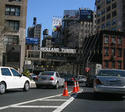Ever since the Great Recession ripped through the economies of the Sunbelt, America’s coastal pundit class has been giddily predicting its demise. Strangled by high-energy prices, cooked by global warming, rejected by a new generation of urban-centric millennials, this vast southern region was doomed to become, in the words of the Atlantic, where the “American dream” has gone to die. If the doomsayers are right, Americans must be the ultimate masochists. After a brief hiatus, people seem to, once again, be streaming towards the expanse of warm-weather states extending from the southeastern seaboard to Phoenix. read more »
Demographics
Forget What the Pundits Tell You, Coastal Cities are Old News - it’s the Sunbelt that’s Booming
- Login to post comments
'Lone Eagle' Cities: Where The Most People Work From Home
In an era of high unemployment and limited opportunity, more Americans are taking matters into their own hands and going to work for themselves out of their homes. read more »
Where New Yorkers are Moving
The American Community Survey has released domestic migration data that was collected over a five year period (2007 to 2011). There is newer domestic migration data available, such as is annually provided by the Census Bureau's population estimates program, but not in the detail that the latest data provides. read more »
Post-Nagin, New Orleans Is On Way To Becoming A Model City
Last week’s conviction of former New Orleans Mayor Ray Nagin on 20 charges of bribery and fraud marks the end of a tumultuous era in the city’s history, and perhaps also the beginning of a new era in American urban politics. Perhaps most remarkable was the almost total lack of protest in New Orleans over the downfall of Nagin, who had relied heavily on polarizing racial politics in his last five years in office. read more »
- Login to post comments
Sustaining Prosperity: A Long Term Vision for the New Orleans Region
This is the executive summary from a new report Sustaining Prosperity: A Long Term Vision for the New Orleans Region, authored by Joel Kotkin for Greater New Orleans, Inc. Download the full report from GNO, Inc. here: gnoinc.org/sustainingprosperity
The recovery of greater New Orleans represents one of the great urban achievements of our era. After decades of slow economic, political and social decline, hurricane Katrina seemed a kind of coup de grâce, smothering the last embers of the region’s vitality. read more »
- Login to post comments
Southern California has Aging Issues
Back in the 1960s, and for well into the 1980s, California stood at the cutting edge of youth culture, the place where trends started and young people clustered. “The California teen, a white, middle-class version of the American dream” raised in a world of “suburbs, cars, and beaches,” notes historian Kirse Granat May, literally shaped the national image of youth, from the Beach Boys and Barbie to Gidget. read more »
America's Future Cities: Where The Youth Population Is Booming
To identify economic hot spots in the making, we often look for where immigrants, young people or entrepreneurs are clustering. But perhaps nothing is a better indicator than those who truly make up generation next — America’s children. read more »
The Evolving Urban Form: The San Francisco Bay Area
Despite planning efforts to restrict it, the Bay Area continues to disperse. For decades, nearly all population and employment growth in the San Jose-San Francisco Combined Statistical Area has been in the suburbs, rather than in the core cities of San Francisco and Oakland. The CSA (Note) is composed of seven adjacent metropolitan areas (San Francisco, San Jose, Santa Cruz, Santa Rosa, Vallejo, Napa, and Stockton). A similar expansion also occurred in the New York CSA. read more »
- Login to post comments
City-Specific Immigration Visas Would Be a Modern Day Indentured Servitude
An idea that’s been kicked around by many is to help turn around struggling cities like Detroit by offering geographically limited immigrations visas. That is, to allow foreigners get their green card if they agree to live in a particular city for a certain number of years.
Michigan Gov. Rick Snyder has now officially endorsed the concept, calling for Detroit to be awarded 50,000 city-specific immigration visas for skilled workers over five years. As the NYT put it: read more »
America's Glass Half-empty, or Half-full?
The stock market is high, real estate prices have resurged, even the unemployment rate is dropping, yet Americans still feel pretty down about the future. A survey released in January by the AP-NORC Center for Public Affairs Research had 54 percent of respondents expecting American life to go downhill over the coming decades. In a December survey, 23 percent of respondents said things will improve over time. read more »
- Login to post comments





















